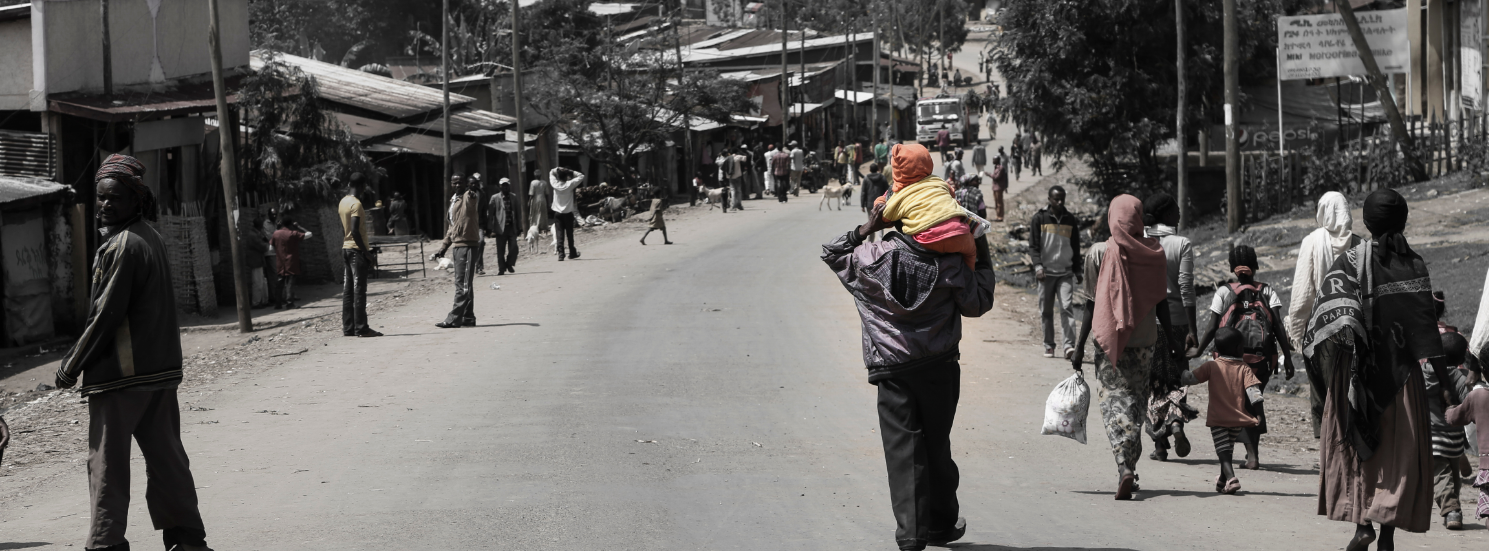HAWASSA HOPE’S STORY
HOW IT ALL BEGAN

A personal connection
In 2008, Charisa and Greg Knight adopted a son from Ethiopia and fell in love with the country and people. Once home, they began to respond to needs they saw in country to try to help. They adopted a second child in 2011. But shortly afterward, the Ethiopian government began limiting international adoptions, and then ended them completely.
“When the government stopped that program, we get like—terrible,” remembered Teshome Teferi, a social worker and program director for Ajuuja Children’s Home Association in Hawassa. ”We can’t feed the kids. We can’t give good care to them. We were forced to minimize the staff and to just give the kids to the government orphanages because they would die otherwise.”
The Knights flew back to Hawassa to see if they could help. ”What we found was a very competent staff that was filled with love for the children, filled with energy to fulfill their mission,” Greg remembered, “but they were lacking in funding.”
The Knights began talking about the situation with friends, family, church members, community members, and were relieved and grateful for the result. A small group of individuals put money together so the children’s home could buy baby formula and other supplies.
Meeting a bigger challenge
But the group soon learned that the bigger problem was why many children ended up in the orphanage—their families simply couldn’t afford to take care of them.
Charisa and Greg’s small network rose to this new challenge. They they began to advocate with their network for a community sponsorship program, in partnership with Ajuuja Children’s Home, and Hawassa Hope was born.
At the beginning, the team sponsored about 20 children. “Nowadays we sponsor 370 children,” Ajuuja founder and director, Eyasu Tegicho said. “All of them are in school and some of them complete graduation from university.”
“Because of this helping, many people have become independent,” he said.
Saying yes to opportunities
Clean water
Education and child care were critical needs, but Hawassa Hope’s growing group of donors realized the Hawassa community had other concerns, and wanted to be part of a solution.
One need was drinking water. Across Ethiopia, leading causes of death come from lack of clean water and poor sanitation. In 2013, Hawassa Hope completed its first community clean water project, and over the next decade, funded 20 more.
Mossy Foot
Another pressing local need was a debilitating condition called Mossy Foot (podoconiosis). Mossy Foot is a reaction to silicates in red clay soil that causes some people’s feet to become painfully rough and enflamed. Left untreated, it can become impossible to work, or walk. In the Sidama region around Hawassa, women are disproportionately affected.
In 2015, Hawassa Hope conducted its first round of Mossy Foot education, providing treatment supplies and closed-toe shoes to prevent new infections. Now, Hawassa Hope works alongside local governments where Mossy Foot is common.
Maternal care
Hawassa Hope learned that many babies brought to Ajuuja Children’s Home had lost their mothers during or after childbirth. The Elsabet Initiative, started in 2016, works with local medical professionals and social workers to give support and education during pregnancy and post-delivery to vulnerable pregnant women. As of 2023, more than 750 women benefitted from the initiative.
Building hope
Hawassa Hope’s programs have continued to grow in size and variety. We remain focused on Hawassa and the Sidama region, with flexibility to meet a wide variety of needs identified by local communities.
- In 2021, we built our own children’s home, run by Ajuuja Children’s Home Association.
- In 2022, we added the Building Hope program to repair and rebuild homes for families in unhealthy or undignified living conditions.
- In 2023, we constructed the first phase of Tesfa Primary School and enrolled our first class of 60 preschoolers!
“That’s how a lot of our things have started,” Charisa says. “A need there and a passion and generosity here…just meet in the middle, and it just comes together.”
Hawassa Hope maintains a close partnership with the Ajuuja Children’s Home Association. Their exceptional dedication and impactful initiatives through Hawassa Hope have made them a top-ranking nonprofit organization in Sidama and across Ethiopia.
“We don’t want to be transactional,” Charisa says. “We didn’t want to just send money; we wanted to have a relationship. Over the years, as we’ve begun to rely on one another, we’ve really have become a family. Every time we go back it’s like returning home again.”
